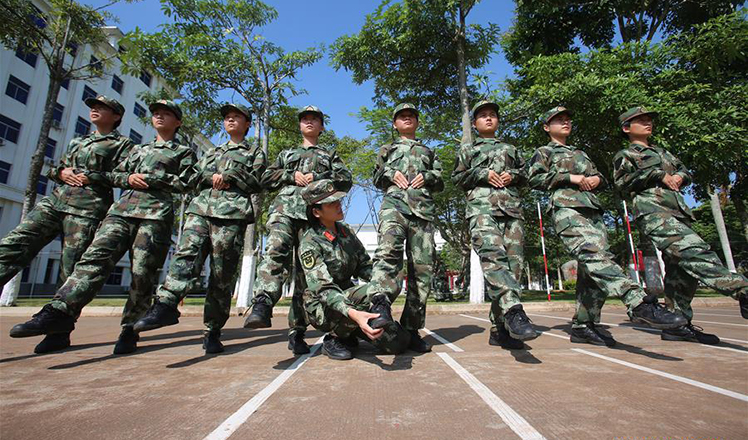No Japan-style bubble in China's house market
Updated: 2016-10-17 07:56
By Zhong Yue(China Daily)
|
||||||||
 |
|
Models of residential buildings are seen at a property showroom in Binjiang district of Hangzhou, Zhejiang province, Sept 14, 2016. The Chinese characters on the boards read "sold out".[Photo/Xinhua] |
In a bid to cool their red-hot property prices, Beijing, Shanghai and Shenzhen, and some major provincial capital cities across China successively introduced measures to limit home buying from the end of September and during the National Day holiday.
Those potential buyers unable to enter the housing market because of soaring prices, hope these regulatory means will reverse the trajectory of home prices to an affordable level. Some of those who have bought homes, however, worry the measures will shrink the value of their property.
Undoubtedly, the adoption of the restrictive home buying measures by 19 cities, most of them first-tier and second-tier cities, is a timely move to curb speculation and reduce rises. But many people are also concerned the "emergency brake" put on these fast-rising housing markets will possibly cause home prices to collapse as happened in Japan in the 1990s. However, such worries are unfounded. China is in a different stage from that of Japan when its property bubble burst. Compared with the interest rate adjustments Japan made to regulate its high realty prices, the restrictive measures formulated by China this time are targeted at restraining speculative demand in the cities where housing prices are believed to be rising as a result of the influx of migrants and speculative demand.
Chinese people are prone to buying real estates, especially when prices climb, and speculative buying prevails when prices are soaring. It is reported that among the couples in Shanghai who divorced during the past months when home prices in the city were rising swiftly, nearly 40 percent got a divorce for the purpose of bypassing the local policy that one family could only buy two homes at most.
By introducing the restrictive measures, the authorities are seeking to cool the overheated property market, not smash the current high home prices. So, most of these measures are mainly to curb speculative demand rather than the demand for a first home. Furthermore, any drastic drop in home prices resulting from these measures will likely cause the authorities to make timely policy adjustments. Thus the restrictive measures are temporary ones only and will not lead to a collapse in the housing market like the one in Japan in the 1990s.
However, many people are drawing comparisons to what Japan did before the collapse of its housing prices in the 1990s, and discussing whether the government will protect property prices or the exchange rate. Around 1990, Japan chose to boost the yen's appreciation through raising its interest rates to attract the flow of foreign funds to Japan. But there is no need to make such a comparison. Aside from its housing market being at a different development stage from that of Japan's at that time, China has also adopted a different monetary policy from its neighbor. China is still in a cycle of interest rate cuts and there is no possibility the government will raise rates. China's central bank has ruled out the possibility of the renminbi's considerable depreciation, although it is expected to continue on a steady downward trajectory to depreciate moderately against the US dollar. A moderate depreciation of the renminbi is conducive to its ongoing economic structural adjustments, given that a weak renminbi will facilitate the country's exports and thus leave more time for it to make the necessary adjustments.
Some foreign media and organizations have raised their forecasts for the growth of China's gross domestic product in 2016. Standard & Poor's for instance has raised its forecast from 6.4 percent to 6.6 percent. That means China's economic growth generally enjoys a relatively optimistic prospect this year, which will undercut the possibility of a drastic decline or collapse of its house prices.
The author is a FXTM analyst on Chinese market.
- China's consumption could offset cooling housing market: report
- Housing project adds residential area to Xi’an park
- New housing restrictions announced
- Concerted efforts needed to tackle housing problem
- More expensive housing is price of change
- Secondhand housing paperwork goes online in Liangjiang New Area
- Restrictive housing policy may fail to cool real estate market
- Hollande, Merkel, Putin discuss how to implement Minsk peace deal
- Pentagon vows to respond to attempted missile attacks at US destroyer near Yemen
- NASA to invite private companies to install modules on space station
- Trump accused of inappropriate touching by two women
- White House denounces terror attacks in Afghanistan
- Republican voters frown on party establishment's criticism of Donald Trump

 Birthday celebration held for panda cubs at Toronto Zoo
Birthday celebration held for panda cubs at Toronto Zoo
 China's top 10 enterprises by revenue in 2015
China's top 10 enterprises by revenue in 2015
 Robots, 3D printed food big hit at Shenzhen Maker Week
Robots, 3D printed food big hit at Shenzhen Maker Week
 Flying over the mountains in wingsuit in Zhangjiajie
Flying over the mountains in wingsuit in Zhangjiajie
 Ten photos from around China: Oct 7-13
Ten photos from around China: Oct 7-13
 Superheroes make surprise visit to children's hospital
Superheroes make surprise visit to children's hospital
 Female soldiers take training in Hainan
Female soldiers take training in Hainan
 Premier Li vows anew to ease market access
Premier Li vows anew to ease market access
Most Viewed
Editor's Picks

|

|

|

|

|

|
Today's Top News
Trump outlines anti-terror plan, proposing extreme vetting for immigrants
Phelps puts spotlight on cupping
US launches airstrikes against IS targets in Libya's Sirte
Ministry slams US-Korean THAAD deployment
Two police officers shot at protest in Dallas
Abe's blame game reveals his policies failing to get results
Ending wildlife trafficking must be policy priority in Asia
Effects of supply-side reform take time to be seen
US Weekly

|

|







